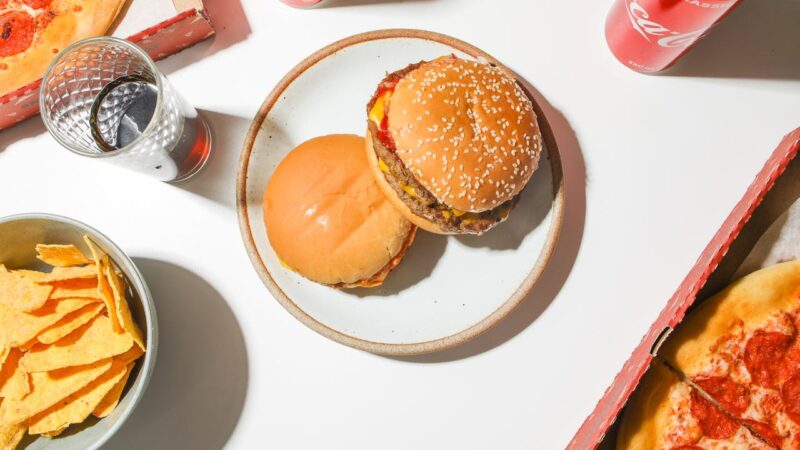Unveiling the Link: High-Fat Diets and Anxiety Levels

In times of stress, it’s common to turn to comfort foods like chocolate or donuts. However, new research suggests that indulging in high-fat diets may actually exacerbate anxiety rather than soothe it. A study conducted by the University of Colorado Boulder found that feeding mice a high-fat diet disrupted their gut bacteria, leading to changes in brain chemicals that heightened feelings of anxiety.
Professor Christopher Lowry, the study’s lead author, pointed out that while many of us associate high-fat foods with mere weight gain, these diets can have deeper implications for mental health. Health guidelines recommend limiting saturated fat intake to 20g per day for women and 30g for men, constituting about 11% of daily caloric intake. Yet, average diets often exceed these limits, with fat making up around 36% of daily calories in the US.
The study observed adolescent rats fed different diets over nine weeks: one group consumed a standard 11% fat diet, while the other ate a high-fat diet comprising 45% fat. Researchers analyzed fecal samples to assess changes in gut flora and conducted behavioral tests to measure anxiety levels. Results showed that rats on the high-fat diet not only gained more weight but also exhibited less diverse gut microbiomes, with an increase in Firmicutes bacteria and a decrease in Bacteroidetes.
Furthermore, genes associated with serotonin synthesis showed heightened activity in the high-fat diet group. While serotonin is typically linked with positive emotions, increased activation of certain neurons can lead to anxiety-like symptoms. Professor Lowry highlighted that these genetic changes in the brain mirrored a state of heightened anxiety.
The mechanism behind this connection involves a possible breakdown in gut health due to unhealthy microbiota, potentially allowing harmful bacteria to enter the bloodstream and communicate with the brain via the vagus nerve. Professor Lowry theorizes that our evolutionary instincts may amplify our sensitivity to factors that threaten our health.
However, not all fats are detrimental. Studies suggest that healthy fats from sources like avocados and omega-3 fatty acids found in nuts, seeds, olive oil, and seafood can offer anti-inflammatory and cognitive benefits, countering the negative effects of unhealthy fats.
In essence, while comfort foods may provide temporary relief, choosing a balanced diet rich in beneficial fats could play a crucial role in maintaining both physical health and mental well-being.
Q&A
Q: How does indulging in high-fat diets affect anxiety levels, according to recent research?
A: Recent research suggests that consuming high-fat diets may exacerbate anxiety rather than alleviate it. Studies conducted at the University of Colorado Boulder found that such diets disrupt gut bacteria in mice, leading to changes in brain chemicals that heighten feelings of anxiety.
Also Read: Understanding Eye Strokes: Risks and Prevention in Summer Heatwaves
Q: Why are high-fat diets linked to increased anxiety?
A: High-fat diets have been linked to increased anxiety due to their impact on gut microbiota and serotonin synthesis in the brain. This can lead to changes in neural activity associated with anxiety-like symptoms.
Q: What are the health guidelines regarding saturated fat intake, and how do average diets compare?
A: Health guidelines recommend limiting saturated fat intake to 20g per day for women and 30g for men, comprising about 11% of daily caloric intake. However, average diets often exceed these limits, with fat making up around 36% of daily calories in the US.
Q: What were the findings of the study involving adolescent rats fed different diets?
A: In the study, rats fed a high-fat diet (45% fat) exhibited not only increased weight gain but also less diverse gut microbiomes compared to those on a standard diet (11% fat). This imbalance in gut flora correlated with heightened anxiety levels observed in behavioral tests.
Q: How do healthy fats contrast with unhealthy fats in terms of mental health impact?
A: Healthy fats from sources like avocados and omega-3 fatty acids found in nuts, seeds, olive oil, and seafood have been shown to offer anti-inflammatory and cognitive benefits. They can counteract the negative effects of unhealthy fats typically found in high-fat diets associated with anxiety.
Q: What role does gut health play in the link between high-fat diets and anxiety?
A: High-fat diets can disrupt gut health by altering microbiota composition, potentially allowing harmful bacteria to affect brain function via the vagus nerve. This mechanism may contribute to heightened anxiety symptoms observed in studies.
Also Read: Hidden Danger in Diet: Excess Salt Can Harm Skin Health
Q: How can dietary choices impact both physical health and mental well-being?
A: Choosing a balanced diet rich in beneficial fats while limiting unhealthy fats can play a crucial role in maintaining both physical health and mental well-being. This approach supports optimal gut health and may help mitigate anxiety symptoms associated with dietary habits.










